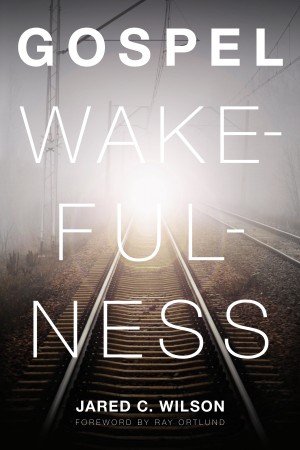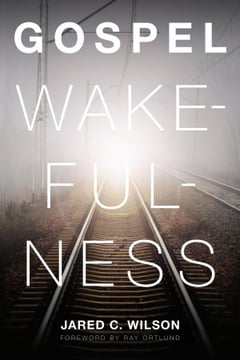Search for topics or resources
Enter your search below and hit enter or click the search icon.
January 10th, 2012 | 4 min read

Read part one here. And settle in: this gets a little long.
Let’s recap a bit before we get into things: Jared Wilson wrote a book that lots of good folks have liked and endorsed. And for good reason: it’s heart-warming, richly written devotional theology. The sort of writing that we need more and not less of.
And yet I have worries about Wilson’s specific deployment of “Gospel wakefulness.”
In a section on renewing our affections, Wilson describes his experience at a blog (that he does not name) that became, in his reading, too concerned with Sarah Palin and Harry Potter. Wilson, who reluctantly joined, began “sharing [his] joys in the gospel” at the blog. I’ll quote in full at this point:
It did not go over well. Commenter after commenter, most of them my co-bloggers, feigned confusion. What is the gospel? How does this apply to anything? Is this all you talk about? Those were the sorts of attitudes I began to encounter. But, apparently, if I wanted to blog about Harry Potter or Sarah Palin, I was welcome to do so.
What was happening? I couldn’t stop talking about the holiday at the sea, and I couldn’t figure out why I should be inordinately enamored with mud pies.
Full disclosure: I was a part of Evangel then and still make the rare contribution now. I wish Jared had stayed on, and have a different take over what transpired. But it’s all out in public, so inquire for yourself.
My concern is the form of argument here, and the role it plays in Wilson’s overall project. In short, Wilson uses his time at Evangel as Exhibit A of Christians who have fallen prey to political idolatry and so corrupted the integrity of the Gospel. His description that his cowriters “feigned confusion” is astonishing. As best I can tell, the questions that he lists (which he curiously then describes as attitudes) are all perfectly legitimate, and if the existence of critiques like Trevin Wax’s means anything, not really resolved by Wilson’s book to the degree he protests.
Unlike Trevin, though, my concern isn’t so much that there’s a two-tiered Christianity lurking here. Rather, it’s that Jared’s form of argument here comes close to making his position impervious to critique.
Of course, it may not always work out that way in practice. And, in fact, it hasn’t: Trevin critiques Jared, Jared responds. Everybody’s happy, right? The exchange is a model, and Jared acquits himself admirably.
My point isn’t that Jared is unteachable, or that he’s got a plank in his eye, or that he’s a Patriots fan (okay, that is a problem). Not having had the pleasure of meeting Jared, I have no idea whether the first two are true. Having no reason to believe they are, I propose we just move on.
Instead, my concern is that when not properly constrained, the conceptual use of “Gospel wakefulness” becomes a back-pocket trump card that can be deployed to end an argument before it begins.
Jared runs the same sort of argument when describing the marks of those who haven’t yet attained Gospel wakefulness. Last on the list? “The idea of gospel centrality makes no sense to you.” This allows him to suggest that, “The critic of the one-note Johnnyism of gospel-centrality just doesn’t get it.”
This is, from what I can tell, leads to full-on epistemic closure, with the walls about as high as you can build them. The quality of people’s arguments about gospel centrality would have no bearing on their epistemic standing--they’re wrong from the outset because they’re still in their slumber.
In other words, the criticism of gospel-centrality as it gets thrown about is itself a sign that Gospel wakefulness has not yet occurred. Wilson has functionally removed the possibility of plausibly suggesting that the gospel can be reduced to an idol, and to even raise the question is to demonstrate one’s own lack of spiritual awakening.
But again, Wilson’s better than his argument implies. In the conclusion, he acknowledges that the gospel might be a shibboleth, but counters with the suggestion that “it could be how people talk when they know the gospel’s power intimately and have resolved to know nothing else.” It’s an excellent suggestion, and worth highlighting. It absolutely could be how such people talk.
But such people could talk in other ways, too, or not nearly talk so much at all (which, in my case, is what I suspect most everyone would prefer).
The worry about the linguistic evaporation that happens when a term is over-used (try shouting “pillow” a hundred times and see what’s left of it) could be motivated by a desire to remove the gospel from the center. But it might also be motivated by a genuine love for the gospel, and a deep and fundamental desire to not see it reduced to a brand that comes pre-packaged and sold on whatever conference or book we’re peddling next.
Our age is not like every age, and because of the oversaturated infotainment market within evangelicalism there may be a prudential argument for finding ways of speaking of the gospel without naming it directly. The case would need filling out, but it’s a question worth considering--and not a question that “Gospel wakefulness” has the categories to answer in itself. Which is why Jared’s suggestion that those who question the one-note Johnnyism of the Gospel “don’t get it” strikes me as problematic.
Of course, none of this means that Gospel wakefulness is itself wrong.
Tomorrow, I’ll propose a few thoughts to help buttress the idea and provide some guardrails so that it doesn’t fall into the thickets I’ve tried to cut through above.
Matthew Lee Anderson is an Associate Professor of Ethics and Theology in Baylor University's Honors College. He has a D.Phil. in Christian Ethics from Oxford University, and is a Perpetual Member of Biola University's Torrey Honors College. In 2005, he founded Mere Orthodoxy.
Topics: